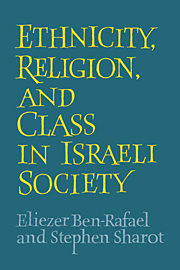Book contents
- Frontmatter
- Contents
- Acknowledgments
- I Theoretical and empirical background
- II Social patterns and behavior
- III Identities and images
- IV The impact of stratification
- V Social cleavages: an overview of Israeli society and some theoretical implications
- Appendix A The sample
- Appendix B Deprivation index
- Appendix C Indexes of ethnic identification
- Glossary
- Notes
- References
- Index
I - Theoretical and empirical background
Published online by Cambridge University Press: 12 September 2009
- Frontmatter
- Contents
- Acknowledgments
- I Theoretical and empirical background
- II Social patterns and behavior
- III Identities and images
- IV The impact of stratification
- V Social cleavages: an overview of Israeli society and some theoretical implications
- Appendix A The sample
- Appendix B Deprivation index
- Appendix C Indexes of ethnic identification
- Glossary
- Notes
- References
- Index
Summary
Ethnicity, class, and religion provide important foci for social cleavages, identifications, and consciousness in many societies, including Israeli society. They differ in many respects but they also converge and interrelate in complex ways. An empirical study of these divisions, including their institutional, behavioral, and subjective forms, is the centerpiece of this book. The dimensions that we decided to study and the questions that we asked can be best understood within the theoretical and empirical framework provided in this part. Here we give the greatest amount of attention to ethnicity, and chapter 1 provides an overview of the definitions, concepts, and theoretical perspectives in the sociological study of ethnicity. The intention is not to provide a complete review of the literature in one chapter but to focus on those topics in the general literature on ethnicity that we believe are relevant to an analysis of ethnicity in Israel. A short review of the relationships between ethnicity and class and between ethnicity and religion is also provided. Chapter 2 sets out the general historical development and present state of ethnic divisions among the Israeli-Jewish population, and chapter 3 discusses critically the theoretical perspectives on ethnicity in Israeli sociology. Our study focuses on four of the largest groups of origin in Israel: Jews from Morocco, Iraq, Rumania, and Poland.
- Type
- Chapter
- Information
- Ethnicity, Religion and Class in Israeli Society , pp. 1 - 2Publisher: Cambridge University PressPrint publication year: 1991



